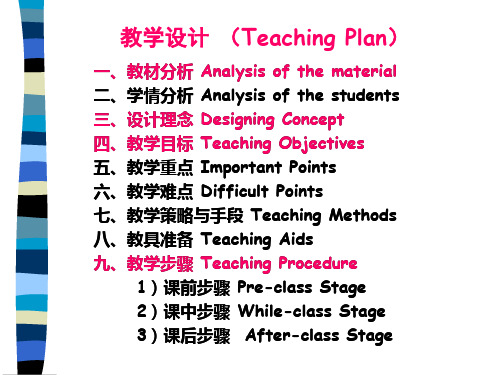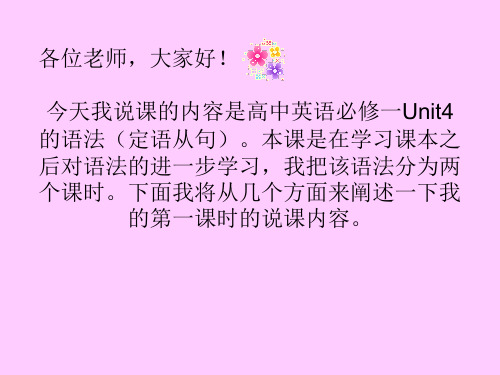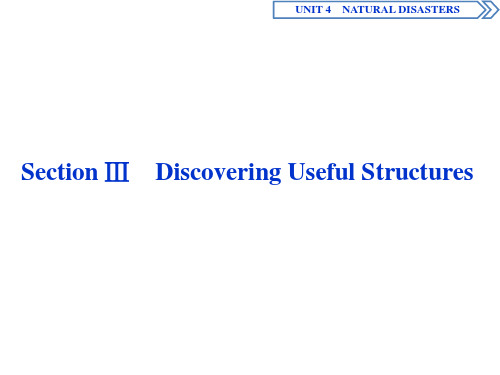高中英语说课ppt
合集下载
高中必修第一册英语《Unit 3 Sports and fitness》获奖说课课件ppt

the father of modern Olympic Games; founder of International Olympic Committee; writer of the Olympic motto:
faster, higher, stronger
Lead in
Look at the posters. What sports events do they show? What do you know about those events?
1. When will the event happen? 2. What’s a “Blue Paint” run? 3. Why is it called a “Blue Paint” run? 4. If 200 people take part in the run and 400 balloons
Practice
Example:
Sam: Hey, Ben, it’s Sam. What are you up to today? Would you like to come to a gym class?
Ben: Hi, Sam. Sure, I don’t have any plans. What time does it start? Sam: At 2:00. It’s at the Fit Gym in the Glory Mall. Ben: OK. How much do I need to pay for the class? Sam: It’s free today. They are giving 3 free classes to new comers.
refuse an invitation
faster, higher, stronger
Lead in
Look at the posters. What sports events do they show? What do you know about those events?
1. When will the event happen? 2. What’s a “Blue Paint” run? 3. Why is it called a “Blue Paint” run? 4. If 200 people take part in the run and 400 balloons
Practice
Example:
Sam: Hey, Ben, it’s Sam. What are you up to today? Would you like to come to a gym class?
Ben: Hi, Sam. Sure, I don’t have any plans. What time does it start? Sam: At 2:00. It’s at the Fit Gym in the Glory Mall. Ben: OK. How much do I need to pay for the class? Sam: It’s free today. They are giving 3 free classes to new comers.
refuse an invitation
高中英语必修一B1M1听说课说课优秀课件

• “Audio-visual” teaching method
• “Task-based” teaching method
Part 5
板书设计
Blackboard Design
A: Hi, xx! How are you doing? B: I'm fine. I have just been to... A: Oh, really? So have I. B: Really? Which language/subject are you studying? ...
目的:使用日常对话表达方式,练习对话,学生表达关于语言课程或其他课程学习的感受, 实现交际目的。
Teaching Methods
导入部分(听前)
lead in
dictatio n
听写填空
main idea
听主旨大意
convers 编对话(听后)
a-tion
the
听细节信息
details
• “communicative” teaching method;
Module 1
Listening and Speaking
听说课
教材分析 学情分析
教学目标及重难点
教学步骤及方法 板书设计
目录
CONTENTS
Part 1
教材分析
外研版英语必修1一 Module 1
My First Day at Senior High
Period 2 Listening and Speaking
Thank you for your listening
the proper way to learn a subject.
Key point:
• “Task-based” teaching method
Part 5
板书设计
Blackboard Design
A: Hi, xx! How are you doing? B: I'm fine. I have just been to... A: Oh, really? So have I. B: Really? Which language/subject are you studying? ...
目的:使用日常对话表达方式,练习对话,学生表达关于语言课程或其他课程学习的感受, 实现交际目的。
Teaching Methods
导入部分(听前)
lead in
dictatio n
听写填空
main idea
听主旨大意
convers 编对话(听后)
a-tion
the
听细节信息
details
• “communicative” teaching method;
Module 1
Listening and Speaking
听说课
教材分析 学情分析
教学目标及重难点
教学步骤及方法 板书设计
目录
CONTENTS
Part 1
教材分析
外研版英语必修1一 Module 1
My First Day at Senior High
Period 2 Listening and Speaking
Thank you for your listening
the proper way to learn a subject.
Key point:
高中英语说课精品PPT课件

学情分析 Analysis of the students
设计教学对象: 高二学生 1. 认知基础: 高中二年级学生已经初步具有一定的认知能力,也掌握了 一定的阅读技能和技巧;高中的学生基本上能用英语清晰 地表达个人观点,准确地描述生活现象或表达个人情感。 2. 心理特征: 高中学生思想活跃,求知欲旺盛,学习态度明确,自我意 识发展迅速并趋向成熟,独立自主性强,有一定的价值取 向。 3. 学习能力: 高中生在阅读的过程中他们会选择性地使用相关的阅读策 略;自主阅读与表达能力已有一定基础,也具备了一定的 团体协作能力,并能进行有效成功的交流、合作、与讨论。
3.转变学习方式,增强教学效果 本课设计通过自学课本、小组讨论、综合分析、课后调查, 统计汇总等活动,为学生自主学习、合作学习、探究学 习提供了空间。
4. 运用探究式教学,启发学生思维 引导学生去发现问题、分析问题和解决问题,引导学生发 散思维,在文章最后“learning by doing”的过程中 达到综合运用英语进行交际的目的。
教学设计 (Teaching Plan)
一、教材分析 Analysis of the material 二、学情分析 Analysis of the students 三、设计理念 Designing Concept 四、教学目标 Teaching Objectives 五、教学重点 Important Points 六、教学难点 Difficult Points 七、教学策略与手段 Teaching Methods 八、教具准备 Teaching Aids 九、教学步骤 Teaching Procedure
改编环节及理由
ห้องสมุดไป่ตู้改编环节
改编形式
改编理由
Preview Task 的设计
人教版高中英语必修一Unit4 的语法(定语从句)说课课件(共24张PPT)

Part four:Homework.(具有承上启下的作用,有助于下节课学习)
1.Remember the table
2. show you a writing with attributive
clauses. (提前老师把复印好的writing范文发给学生下去)
3. finish your own writing with attributive
Which boy is my son?
My son
Jack
裤子是白色的男孩是我儿子。 The boy whose trousers are white is my son.
The boy the trousers of whom are white is my son.
关系代词的实质
Join the following sentences: A plane is a machine. The machine can fly.
groups.
只用that的情况
•当先行词是all, few,none, some,little, •everything, •anything, •nothing ,或 被every, any, all, some, no, little, few, much •等词修饰时
•当先行词被 序数词或形 容词最高级, 以及极端词
人,物
that
whose
物: which
关系代词:人或物,充当主,宾,定
指代 在从句 功能 中的作用
指代人
指代物
主语
who/that which/that
宾语
whom / which/that
who/that
定语
whose
高中英语说课课件_Unit_2__working_the_land

Types and characteristics of burns
How many types of burns are there? and what are they? 1. First degree burns 2. Second degree burns 3. Third degree burns
Unit 5 First aid
三:Teaching methods
1. Task-based Language Teaching Method 2. Individual work, pair work and group work 3. Discussion Ⅱ. Teaching aids A multi-media computer and a blackboard.
Unit 5 Frst aid
Lead-in and Pre-reading
A beautiful girl doesn’t like wearing short-sleeved shirts or dresses. Do you know wh Because she was burned by hot porridge and h a scar. In fact, if her father had known first aid for burns, there wouldn’t have been such a sca
四:Teaching procedures Step 2:
Unit 5 Frst aid
Reading
What does this text talk about? This passage mainly tells us the ______ of functions
人教必修三 Unit 1 Festivals 说课课件(36PPT)

1.TThheeaynwcioeunltdpesotaprlveeniefefdono’d wt wasordriyffaicbuolut ttothfeinird.
food.
F
2.Hthaeldloewadee. nIudseedsitgonbetahfiesstaivcatlivinitteyndteodTto honor
and presents to our friends and relatives
Which festival do you like
bTesht?e purpose of this activity is to help students prepare for the reading passage.
Dragon Boat Festival
On the 5th day of May lunar month
• In memory of the beloved poet QuYuan who died in 278 BC
• Eat rice dumplings/ zongzi and watch dragon boat races
2.Festivals of the Dead
1.How do Japanese honor their ancestors?
They have a festival called Obon, when people should go to clean_g_r_a_v_e_sand light in_c_e_n__se to honor their_a_n__c_e_s_t_o_r_s. They light__la_m__p_sand play music ________.
高中英语说课课件_精品!

game shows
TV series films
cartoons
sports programmes
the news
talk shows
music programmes
Do you think watching all of these TV programmes a whole day is a perfect day ? What about Brain and Bob ?
Ⅱ.短语完型
答案提供者:
1.find out 查明,弄清 2.at the moment 目前,此时此刻 3.get changed 换衣服 4.switch over 转换频道,转变 5.wake up 醒来 6.go off (铃、爆竹等)响 7.take up 占据 8.be filled with 充满着
Ⅰ.单词识记
答案提供者:
5. complain(vi.)抱怨;投诉 → complaint (n.)抱怨 6. remote(adj.)遥远的 → faraway(同义 词)远离的,遥远的 7. urgent(adj.)急迫的,紧急的 → urgency(n.)紧急事件 → urgently(adv.) 紧急地,急迫地 8. bored(adj.)厌烦的,不感兴趣的 → boring(adj.)令人厌烦的 → bore(v.)使 厌烦
推理判断题
judge
infer
推理判断题即在理解原文表面文字信息的基础上,作出一定的判断和推 理,从而得出文章的隐含意义和深层意义。推断一定要以文章所提供的 事实为依据,不能凭空想象。
推理判断题常见的提问方式: (1)以infer, suggest, mean, conclude等提问; (2)提问中常带有表示推测的情态动词,如can, might等。
高中必修第一册英语《Unit 4 Natural disasters》获奖说课课件ppt

栏目 导引
UNIT 4 NATURAL DISASTERS
③ Some strange customs have survived ___f_r_o_m_____ earlier times. 有些奇怪的风俗是从早年流传下来的。 ④ The old lady has survived all her sisters and brothers ___b_y_______ ten years. 那位老妇人比她所有的兄弟姐妹晚去世 10 年。
(1)A survive B (by)... survive on survive from (2)survivor n. survival n.
A 比 B 活得长…… 依靠……生存下来 从……存活下来,流传下来 幸存者 [U]幸存;[C]残存物
栏目 导引
UNIT 4 NATURAL DISASTERS
He was the only survivor in that bad accident, and after the survival, he has been living a happy and healthy life.
栏目 导引
UNIT 4 NATURAL DISASTERS
关系代词引导的限制性定语从句
UNIT 4 NATURAL DISASTERS
supply n.供应(量);补给;[pl.]补给品 vt.供应;供给
(教材 P52)The supplies which were provided to the disaster area were collected from around the country. 向灾区提供的物资是从全国各地收集来的。
栏目 导引
UNIT 4 NATURAL DISASTERS
UNIT 4 NATURAL DISASTERS
③ Some strange customs have survived ___f_r_o_m_____ earlier times. 有些奇怪的风俗是从早年流传下来的。 ④ The old lady has survived all her sisters and brothers ___b_y_______ ten years. 那位老妇人比她所有的兄弟姐妹晚去世 10 年。
(1)A survive B (by)... survive on survive from (2)survivor n. survival n.
A 比 B 活得长…… 依靠……生存下来 从……存活下来,流传下来 幸存者 [U]幸存;[C]残存物
栏目 导引
UNIT 4 NATURAL DISASTERS
He was the only survivor in that bad accident, and after the survival, he has been living a happy and healthy life.
栏目 导引
UNIT 4 NATURAL DISASTERS
关系代词引导的限制性定语从句
UNIT 4 NATURAL DISASTERS
supply n.供应(量);补给;[pl.]补给品 vt.供应;供给
(教材 P52)The supplies which were provided to the disaster area were collected from around the country. 向灾区提供的物资是从全国各地收集来的。
栏目 导引
UNIT 4 NATURAL DISASTERS
